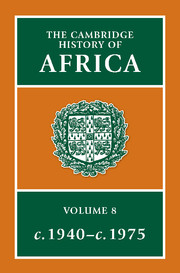Book contents
- Frontmatter
- Introduction
- 1 The Second World War: prelude to decolonisation in Africa
- 2 Decolonisation and the problems of independence
- 3 Pan-Africanism Since 1940
- 4 Social and cultural change
- 5 The economic evolution of developing Africa
- 6 Southern Africa
- 7 English-speaking West Africa
- 8 East and Central Africa
- 9 The Horn of Africa
- 10 Egypt, Libya and the Sudan
- 11 The Maghrib
- 12 French-speaking tropical Africa
- 13 Madagascar
- 14 Zaire, Rwanda and Burundi
- 15 Portuguese-speaking Africa
- Bibliographical essays
- Bibliography
- Index
- References
8 - East and Central Africa
Published online by Cambridge University Press: 28 March 2008
- Frontmatter
- Introduction
- 1 The Second World War: prelude to decolonisation in Africa
- 2 Decolonisation and the problems of independence
- 3 Pan-Africanism Since 1940
- 4 Social and cultural change
- 5 The economic evolution of developing Africa
- 6 Southern Africa
- 7 English-speaking West Africa
- 8 East and Central Africa
- 9 The Horn of Africa
- 10 Egypt, Libya and the Sudan
- 11 The Maghrib
- 12 French-speaking tropical Africa
- 13 Madagascar
- 14 Zaire, Rwanda and Burundi
- 15 Portuguese-speaking Africa
- Bibliographical essays
- Bibliography
- Index
- References
Summary
In the 1940s it was the racial composition of the East and Central African societies that presented the critical obstacle to African advance. Although there was in 1940 a distinction in the British mind between the ‘colonies of settlement’, Kenya, Northern and Southern Rhodesia, on the one hand, and the ‘colonies of administration’, Uganda, Tanganyika and Nyasaland, on the other, the settler presence dominated the region in such a manner as to preclude the easy adoption of the ‘West African’ solution in the face of the demand for African independence. Power was nevertheless transferred to African not European hands, and by 1964 all these territories save Southern Rhodesia were independent African states. A year later, the settler rebellion in Southern Rhodesia dispelled any remaining illusions of Britain's effective control over that territory.
Independence, therefore, represented a fundamental landmark in this period, opening up new arenas for African participation and removing significant political, although not economic, constraints. The crucial effect, for the first post-colonial decade at least, was upon the internal balance of power once the colonial arbiter had withdrawn. The independence settlement conferred control of the institutions of state upon the dominant nationalist leadership, but it did not necessarily ensure its continued authority. Its legitimacy depended upon a complex internal political balance so that those who inherited the colonial mantle had both to nurture that legitimacy and to build the new state. The first decade of independence was therefore concerned primarily with the distribution of power in the post-colonial state, although the nature of the conflict was frequently obscured by the rhetoric of development.
- Type
- Chapter
- Information
- The Cambridge History of Africa , pp. 383 - 457Publisher: Cambridge University PressPrint publication year: 1984
References
- 1
- Cited by

